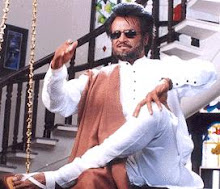Yodhakaa
Last night, in one of Madras' dingier underground pubs, Star Rock, I was nursing a stiff one when a pretty Sri raagam in a vibrant female voice enveloped me (the sentence could also be "vibrant Sri raagam in a pretty female voice", but I like the adjectives the other way around). It felt like sacrilege to be lounging on spongy sofas and nibbling on peanuts. A slide guitar launched into a drawling solo, accompanied by a punchy bass, bright guitars and groovy percussion. This wasn't the everyday devout Sri raagam, this was something else. Without realising it, I was counting fours with my feet, dissecting the song into swara-s and raga patterns and exclaiming "Sabhaash!" at a cute phrase.
Soon, I realised that I would be doing a disservice to the richness of the band's sound if I approached their music as raga-based fusion. Chennai's hot new act, Yodhakaa, throws a curious mixed-bag of music at its audience - it pits a strong Carnatic aesthetic amidst a folksy rock and samba-jazz-like environment. There are portions in their repertoire that stick to known (and unknown) ragas, but unlike most Indian fusion bands, the band doesn't seem constrained by them. They borrow Carnatic music's style, its sounding system, its way of embellishing notes and enunciating lyrics, but not its rigidity. (As is evident from this paragraph, the music isn't easy to compartmentalise.)
The easy route would be to call it "Carnatic Fusion", but that has become a bad word these days; it conjures soundscapes of jarring Hamsadhwani accompanied by keyboards and rhythm pads. The drummer, Siva, who did most of the (unnecessary) talking, said, "Hey! We're Yodhakaa, and we play Indian music... contemporary Indian music!" This term sounds like the evil twin sister of "fusion", I know, but Yodhakaa have earned the right to use it. For all their mixed-bag of influences, their music is distinctly Indian. Good music doesn't live and grow in isolation, it is a product of the music around it, and Yodhakaa is a testament to that - it doesn't sound like a "fusion" of styles, but like a new aesthetic in itself.
Its other strength is the high quality of its musicians. Subhiksha and Pradeep combine beautifully on vocals, and Pradeep plays a most interesting slide guitar (built from scratch, he says) that produces every nuance of Indian music with depth and clarity. The drums and bass give the band a groovy grounding that sets them apart from most Indian acts, and Akshay on the guitars plays with sensitivity and innovation.
For all this inventiveness, the use of "ancient Sanskrit slokas" seems like a gimmick. That is the only pretentious part of their music. And this leads to my questioning of the term "contemporary" - I can't think of a contemporary Indian connecting with these lyrics. The slokas are religious in content, but the music does not seem to revel in the religiousness - they might as well be replaced by nonsense syllables (the band's name itself, some internet research tells me, was chosen only for its phonetic value), and it would take nothing away from the music. Many of these old slokas are in the anushtup-chhandas, a metre of four lines of eight syllables with a specified arrangement of long and short syllables. Yodhakaa's music, as a result, becomes very similar in its underlying rhythm. In many songs, the verses are all sung in the same tune, and are placed almost as an interlude to the solos. Even if the band wants to stick to Sanskrit slokas, there are devilish little ones brimming with humour and philosophy that might work better than the Hanuman Ashtakam or a series of slokas on the Dasaavataaram (which the clueless drummer described as being "about destruction").
Listening to Yodhakaa gave me the feeling that they would be better in a recording than live (I'm still kicking myself for not picking up their CD that night - it would be nice for the extended drives from work to home). They were extremely tight, don't get me wrong, but they lacked spontaneous energy that lifts live performances. Maybe they were too tight? (The energy high point of the concert was what they described as their "crazy stuff" - "Even we don't know what we're doing!") Their energy is subtler, and their strength is their total understanding of each other's music, but, an improvisational conversation would have been nice amidst numerous monologues. Especially live.
Ultimately, these are only minor irritants in a performance that was truly top-class. Highly recommended.




3 replies:
Okay.
I wouldn't classify this as fusion. Yes, they use western instruments. But they sound very much Indian with very light western influences. Only the bass guitar is very western, otherwise a good indian band.
Great find!
Unless by contemporary them mean a modern way of communicating religion, which would be something like Christian Rock... Hindu Blues perhaps? :Psyst
Sorry that is just supposed to be a :P at the end, where the "syst" came from god only knows.
Post a Comment